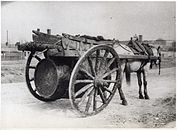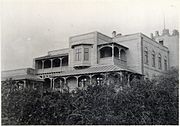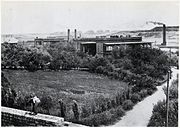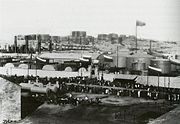The Petroleum Production Company Nobel Brothers, Limited, or Branobel (short for братьев Нобель "brat'yev Nobel" – "Nobel Brothers" in Russian), was an oil company set up by Ludvig Nobel and Baron Peter von Bilderling. It operated mainly in Baku, Azerbaijan, but also in Cheleken, Turkmenistan. Originally established by Robert Nobel (who contributed 25,000 rubles) and the investments of barons Peter von Bilderling (300,000 rubles) and Standertskjöld (150,000 rubles) as a distillery in 1876, it became, during the late-19th century, one of the largest oil-companies in the world.
History

The Nobel Brothers Petroleum Company was an oil-producing company that had its origins in a distillery, founded by Robert and Ludvig Nobel in Baku in 1876, which, in 1879, turned into a shareholding company headquartered in St. Petersburg. The share capital of three million rubles was divided as follows: 53,7% Ludwig Nobel, 31,0% Baron Peter von Bilderling, 4,7% I.J. Zabelskiv, 3,8% Alfred Nobel, 3,3% Robert Nobel, 1,7% au Baron Alexandre von Bilderling. Pipeline transport was pioneered near Baku by Vladimir Shukhov and the Branobel company in 1878–1880. On 10 April 1902, the company signed a contract for the purchase of oil fields in Romany, which were owned by the oil producer Isabey Hajinsky. On 17 October 1905, in accordance with the Committee of Ministers, the company purchased the oil fields owned by oil producer A. Adamov. The company's fixed capital in 1914–1917 was 30 million rubles. By 1916, it was the largest oil company in Russia, producing 76 million poods of oil.
Between 1877 and 1901, the company drilled over 500 wells, produced 150 million barrels of oil, and employed 12,000 workers.
Challenges

In 1912, the Russian General Oil Corporation was founded in London as an English holding company and united some 20 of the most important Russian and foreign banks. These included:
- A.I. Mantashev & Co.
- G.M. Lianozov Sons
- Moscow-Caucasus Trade Company
- Caspian Partnership
- Russian Petroleum Society
- Absheron Petroleum Society
By 1914, the fixed capital in oil exceeded 120 million rubles. The Russian General Oil Corporation, buying a considerable number of shares in the Berlin Exchange, attempted to take control of Branobel. The move failed and by 1916 Emanuel Nobel had bought not only a considerable share in the Russian General Oil Corporation, but had also established control over other oil businesses in the region, such as Volga-Baku Company, A.I. Mantashev & Co., the Anglo-Russian Maximov Oil Company in London and G.M. Lianozov Sons, of which he personally owned a third.
About 12% of the money left to establish the Nobel Prizes by Alfred Nobel came from his shares in the company; he was its largest individual investor.
Russian Revolution and Branobel
On 28 April 1920, the Bolsheviks seized power in Baku after the Red Army invasion of Azerbaijan and Branobel's oil business in Azerbaijan was nationalized. In May 1920, the Nobel family sold almost half the Branobel's shares in its possession to Standard Oil of New Jersey. At the time it was considered uncertain whether the Bolshevik regime would last and the negotiation led by Gustaf Nobel, on one side, and Walter C. Teagle, on the other, proved to be a profitable masterstroke for the Nobel family.
Branobel was formally dissolved in 1959 and its last President was Nils Nobel-Oleinikoff, son of Marta Nobel-Oleinikoff and grandson of Ludvig Nobel.
Photogallery
- More photos can be found at Tekniska museet in Stockholm, Sweden.
Gallery
-
 The Nobels' oil facilities in Baku
The Nobels' oil facilities in Baku
-
 Ludwig Nobel's Mechanical Workshop in Petersburg, Branobels board downstairs
Ludwig Nobel's Mechanical Workshop in Petersburg, Branobels board downstairs
-
 Older naphtha transportation
Older naphtha transportation
-
 Zoroaster, the world's first tanker, 2000 ton tanker for the Caspian Sea, design by Ludvig Nobel and Sven Alexander Almqvist, built by Sven Alexander Almqvist at Motala Verkstad and delivered to the Nobel brothers in Russia
Zoroaster, the world's first tanker, 2000 ton tanker for the Caspian Sea, design by Ludvig Nobel and Sven Alexander Almqvist, built by Sven Alexander Almqvist at Motala Verkstad and delivered to the Nobel brothers in Russia
-
 The Nobels' oil facilities in Baku
The Nobels' oil facilities in Baku
-
 The Nobels' oil facilities in Baku
The Nobels' oil facilities in Baku
-
 Baku
Baku
-
 Baku
Baku
-
 The managers' residence Villa Petrolea in Baku
The managers' residence Villa Petrolea in Baku
-
 The managers' residence Villa Petrolea in Baku
The managers' residence Villa Petrolea in Baku
-
 The managers residence Villa Petrolea in Baku
The managers residence Villa Petrolea in Baku
-
 Stamp of Azerbaijan, 1994
Stamp of Azerbaijan, 1994
-
 In 1888, Tsar Alexander III visited Baku with his family and ministers. Engineer Edvin Bergroth was responsible for security, and despite all the threats against the imperial family, the Tsar was able to walk around the Nobels' factories without any visible police nearby.
In 1888, Tsar Alexander III visited Baku with his family and ministers. Engineer Edvin Bergroth was responsible for security, and despite all the threats against the imperial family, the Tsar was able to walk around the Nobels' factories without any visible police nearby.
See also
References
- Branobel celebrates its 30th anniversary – but the Baku oil is running out
- Blau, Eve; Rupnik, Ivan (2019). Baku: Oil and Urbanism. Park Books. pp. 34–43. ISBN 9783038600763.
- Tolf, Robert (1976): The Russian Rockefellers, Stanford, p. 188-190. ISBN 0-8179-6581-5
- LeVine, Steve (2007): The Oil and the Glory Random House, p. 33-34. ISBN 978-0-375-50614-7
- Tolf, Robert, The Russian Rockefellers (Stanford, 1976)
- Yergin, Daniel (2003): The Prize: the Epic Quest for Oil, Money and Power, Free Press, p. 58. ISBN 0-671-79932-0
- Åsbrink, Brita (2001): Ludvig Nobel: "Petroleum har en lysande framtid!" Wahlström & Widstrand, p. 19. ISBN 978-91-46-18181-1
- Mir-Babayev M.F. The role of Azerbaijan in the World's oil industry – "Oil-Industry History" (USA), 2011, v. 12, no. 1, p. 109-123.
- Mir-Babayev M.F. and Atabeyli B. The unknown Nobel Prize in Baku – "Oil-Industry History" (USA), 2013, v. 14, no. 1, p. 117-124.
External links
- The Nobels and Baku Oil
- Azerbaijan's Oil History
- First pipelines Branobel company
- Archived 30 May 2008 at the Wayback Machine
- The Tsaritsyn Heritage of the Nobel Brothers
- The Branobel History Project
| Energy in Azerbaijan | ||||||||||||
|---|---|---|---|---|---|---|---|---|---|---|---|---|
| Oil and gas |
|  | ||||||||||
| Hydroelectric | ||||||||||||
| See also | ||||||||||||
- Defunct oil companies of Russia
- Oil and gas companies of Azerbaijan
- Energy companies established in 1876
- Non-renewable resource companies established in 1876
- Non-renewable resource companies disestablished in 1959
- Nobel family
- 1876 establishments in the Russian Empire
- Defunct energy companies of the Soviet Union